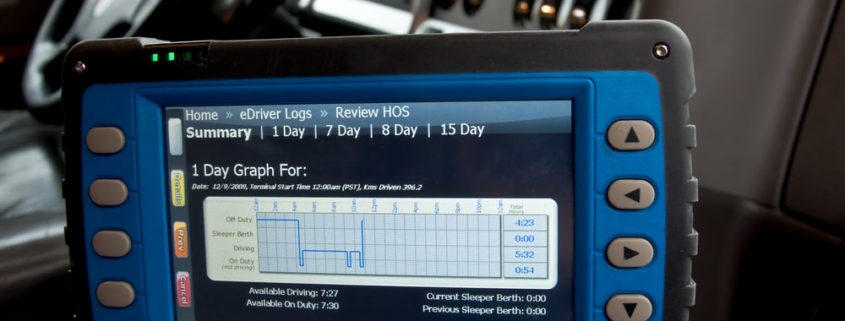What Do Electronic Logging Devices Mean for Your Truck Accident Claim?
Trucking accidents can result in catastrophic consequences for injured victims. The large size and load of a commercial truck make these accidents more dangerous and impactful compared to passenger vehicles. Truck accidents often occur because the negligent truck driver was fatigued or drowsy because of doing excessive driving beyond the stipulated work hours.
Electronic logging devices can play a vital role in proving negligence when a truck crash occurs. A diligent truck accident attorney can help you gather the necessary evidence from electronic logging devices to support your personal injury claim.
What are Electronic Logging Devices?
ELDs or electronic logging devices are federally mandated machines that are installed on commercial trucks as per a Federal Motor Carrier Safety Administration (FMCSA) rule. These are handy data collectors that maintain accurate driving records. Trucking hours were tracked manually before the implementation of ELD.
There was a lot of dishonesty in this method. Truck drivers routinely fudged data for meeting unrealistic delivery deadlines. They violated federal hours-of-service (HOS) regulations. ELDs help in ensuring accurate records for keeping drivers and trucking companies honest.
Information Tracked by ELDs in Florida
ELDs synchronize with the vehicle’s engine once installed. It records all vehicle parameters. The data is stored automatically, making it next to impossible to be tampered with by the driver.
ELDs provide standardized data that can be easily transferred to law enforcement officers conducting roadside compliance reviews. This makes it harder for drivers to hide their discrepancies.
Several factors of the vehicle are tracked by ELDs. These include:
- Total drive time: ELDs record the number of hours the truck is driven and whether it has surpassed the mandated hours.
- Mileage: The device monitors the miles driven within a 24-hour period to ensure the drivers remain within an appropriate range.
- Idling: Electronic logging devices track the extent to which a truck has been idle, indicating whether all off-duty periods were properly taken or not.
- Driving behavior: ELDs record hard braking, speeding, swerving, and other unsafe driving maneuvers.
Compiling ELD Evidence
Electronic logging devices provide forgery-resistant data. These devices offer key pieces of evidence in trucking accidents. They can verify whether a driver has surpassed federal limits in regard to driving time. ELDs also help in determining the sudden maneuvers that led to the accident. A successful car accident attorney may be able to link these to drowsy driving to establish negligence and fault.
Nearly 800 people were estimated to have died in drowsy-driving accidents as per the National Highway Traffic Safety Administration (NHSTA). Fatigued driving is a major cause of truck-related accidents. You should consider retaining the services of a capable truck accident attorney quickly if you or someone you love has suffered injuries or was killed in a truck accident.
It’s critical to gather data from the black box as quickly as possible to confirm your version of the events leading to the accident. Established law firms have access to qualified accident reconstruction experts that can inspect the truck involved and perform an analysis. This will further help in strengthening your lawsuit.
All drivers have the duty to act responsibly behind the wheel and adhere to the law. Drivers can be held accountable when they fail in this duty. Legal claims can provide compensation to victims of truck accidents.
ELD Help Truck Accident Claims in Florida
Electronic logging devices play a major role in ensuring that truck drivers get adequate rest to perform their duties in a safe manner. The federal rule makes it necessary for all trucking companies to fit their fleet with electronic logging devices. These devices can provide information related to the truck’s motion and current logged hours.
ELD can help if you were injured in a Florida truck accident. They can collect data accurately regarding the Hours of Service (HOS) regulations at the time of the truck accident. It can also show the speed at which the truck was going at when the accident occurred. And it can provide information about any sudden unsafe maneuvers performed by the truck driver leading to the accident.
The best part about electronic logging devices is that they collect data impartially about the crash and can be used for supporting your side of the story. For instance, if you are parked at a gas station and a truck rams into you, the first defense used by the truck driver would be that you ran into him.
Earlier, accident victims and their attorneys had to rely on eyewitnesses and surveillance footage of the crash. Now, ELDs can provide essential data that the truck was in motion and it was the truck driver that ran into you. However, you need to understand that data gathered from an ELD is a double-edged sword.
Attorneys for the insurance or trucking company can also use the data to prove the driver was following HOS guidelines and was way within legal limits when the crash happened. They may use the ELD data for proving that no negligence occurred and that it was just an accident. This makes it important that you work with a qualified truck accident attorney.
Choose a Reputable Truck Accident Lawyer to Maximize Your Compensation
The experienced legal team at Whibbs Stone Barnett, P.A. is here to help you navigate the complexities of truck accident claims. We will leave no stone unturned to collect evidence and build a strong case to hold the negligent truck driver and trucking company liable for your damages. To set up your free consultation with our lawyers, call us at 850-409-6328 or reach us online.



